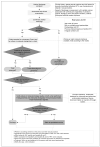Brazilian Protocol for Sexually Transmitted Infections, 2020: infections that cause urethral discharge
- PMID: 34008729
- PMCID: PMC8210486
- DOI: 10.1590/0037-8682-633-2020
Brazilian Protocol for Sexually Transmitted Infections, 2020: infections that cause urethral discharge
Abstract
This article approaches infections that cause urethral discharge. This theme is part of the Clinical Protocol and Therapeutic Guidelines for Comprehensive Care for People with Sexually Transmitted Infections, published by the Ministry of Health of Brazil in 2020. These guidelines were prepared based on scientific evidence and validated in discussions with experts. Urethritis can cause severe and even irreversible health damage when not properly treated, or when the microorganism develops antimicrobial resistance. It is noteworthy that the high levels of antimicrobial resistance grown by pathogens that cause urethritis comprises a global emergency in public health. This article presents epidemiological and clinical aspects, recommendations on diagnostic and treatment, and strategies for surveillance, prevention, and control actions for infections that cause urethral discharge, to contribute to managers' and health professionals' care qualification. Associated factors with urethritis are: young age, low socioeconomic level, multiple partnerships or new sexual partnership, history of STI, irregular use of condoms, and lack of access to adequate diagnosis and treatment.
Figures




References
-
- Brasil. Ministério da Saúde . Diário Oficial da União. Brasília (DF): Oct, 2018. [2020 jun 28]. Portaria MS/SCTIE nº 42, de 5 de outubro de 2018. Torna pública a decisão de aprovar o Protocolo Clínico e Diretrizes Terapêuticas para Atenção Integral às Pessoas com Infecções Sexualmente Transmissíveis (IST), no âmbito do Sistema Único de Saúde - SUS. [Internet] Seção 1:88. Available from: http://bvsms.saude.gov.br/bvs/saudelegis/sctie/2018/prt0042_08_10_2018.html.
-
- Ministério da Saúde (BR). Secretaria de Vigilância em Saúde. Departamento de Doenças de Condições Crônicas e Infecções Sexualmente Transmissíveis . Protocolo clínico e diretrizes terapêuticas para atenção integral às pessoas com infecções sexualmente transmissíveis (IST) Brasília: Ministério da Saúde; 2020. [2020 out 13]. 131. [Internet] Available from: http://www.aids.gov.br/pt-br/pub/2015/protocolo-clinico-e-diretrizes-ter....
-
- Rowley J, Vander Hoorn S, Korenromp E, Low N, Unemo M, Abud-Raddad L, et al. Chlamydia, gonorrhoea, trichomoniasis and syphilis: global prevalence and incidence estimates, 2016. [2020 Jun 28];Bull World Health Organ. 2019 Aug;97(8):548–562. doi: 10.2471/BLT.18.228486. [Internet] - DOI - PMC - PubMed
-
- Baumann L, Cina M, Egli-Gany D, Goutaki M, Halbeisen FS, Lohrer G, et al. Prevalence of Mycoplasma genitalium in different population groups: systematic review andmeta-analysis. [2020 Jun 28];Sex Transm Infect. 2018 Jun;94(4):255–262. doi: 10.1136/sextrans-2017-053384. [Internet] - DOI - PMC - PubMed
MeSH terms
LinkOut - more resources
Full Text Sources
Other Literature Sources
Medical

